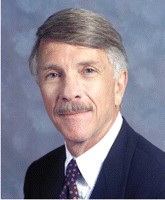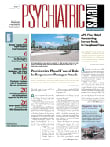For almost 10 years, Michelle Riba and I served as co-editors for the Review of Psychiatry, an annual volume published by American Psychiatric Publishing Inc. (now American Psychiatric Publishing). This was a great opportunity in the pre-electronic age to bring the newest research findings and clinical wisdom, on a broad range of topics, to a wide readership. For several years running, I proposed to APPI that we dedicate a volume to prevention, but I was told that the idea was premature, since we didn't know enough about it. I guess that might have been true (though I was never totally convinced), but even if so, I thought we should bring attention to this important gap in our knowledge.
I'm happy to say that things have changed a lot since then. We now know a great deal about genetic and psychosocial risk factors, and we know more about early manifestations of illness. Innovative strategies have been developed that involve working with at-risk young people and their families that can reroute high-risk youth onto healthier pathways. But there are complex and challenging aspects to these efforts. Kids in their preteens and early teens may not be receptive to help; families may find it hard to accept that, for example, rowdy or odd behavior or emotions on hyperdrive reflect anything more than the normal turbulence of adolescence. And we need to be as sure as possible that impaired functioning and troubled behavior in these early years truly do represent early signs of illness, since recommending treatment at this stage is a serious responsibility.
I recall two examples of the sensitive nature of this work. While I was at Columbia in New York, a group of researchers working with David Shaffer were introducing the use of the Diagnostic Interview Schedule for Children (DISC) to screen high-school students for major categories of psychiatric illness. At one school, the researchers were turned away, after families loudly protested that they did not want their children "labeled" as mentally ill.
A second example occurred in Charleston, S.C., where I was trying to facilitate the establishment of a new satellite location for the "Teen Screen" program, which had developed a network of screening programs throughout the country. We had everything lined up, with strong support from the mayor, and three schools had agreed to launch pilot trials; however, a new superintendent of schools quietly scuttled the proposal. I later found out that the superintendent was worried about being responsible for an influx of students with newly diagnosed illnesses for which there would be insufficient treatment resources (even though these resources had already been identified by the planners of the program). These are not trivial concerns, of course, so early intervention strategies need to be rolled out with sensitivity and patience.
Many APA members have been working hard to advocate about the importance of early intervention, and at the risk of leaving many of these unnamed, I particularly want to bring attention to the work of Carl Bell, who has tirelessly waved the prevention flag—especially through his appointment to the Committee on the Prevention of Mental Disorders and Substance Abuse Among Children of the Institute of Medicine.
I had the opportunity recently, at the Third World Congress of Asian Psychiatry in Melbourne, Australia, to hear two outstanding presentations that illustrate this progress. One talk was by Patrick McGorry, whose voice has long been one of the strongest in the prevention world and who last year was named "Australian of the Year." He emphasized the need for early detection, but expressed concern that there are long delays or failure of access to care after diagnostic thresholds have been reached, greatly worsening the prognosis in many conditions. According to McGorry, only 13 percent of young men and 31 percent of young women access the mental health care they need. Interestingly, he then referred to "21st Century Care" as finding "the right app at the right time." He described a wonderful new mental health program for teens in Australia called "Headspace," which is a growing network of centers designed and operated by teens themselves, where high-tech, interconnected social networking is the name of the game. Bravo!
The second presentation was by Matcheri Keshavan from Harvard, who reviewed the neurobiology of schizophrenia. The first question he posed was, "When do psychotic disorders really begin?" He presented evidence that although psychosis typically begins in adolescence, there is a long preadolescent prodrome during which premorbid brain alterations occur, followed by cognitive and language impairments, attentional/impulse control deficits, affect dysregulation, and social deficits—all before the appearance of psychosis itself. Keshavan then illustrated the stages of brain development in childhood and adolescence, stipulating that the prefrontal cortex is the last part of the brain to mature and that cognitive control, emotion regulation, and capacity to cope with stress only come online in later developmental stages. All parents of teenagers know this already, of course! But the sobering parts of the talk were the remarkable differences in the side-by-side images of the developing brains of unaffected young people, compared with the images of those later diagnosed with schizophrenia.
Keshavan summarized what he called the "risk-plasticity model of development of schizophrenia," and he argued that we need to learn more about the interactions between the increased psychosocial and biological stress in adolescence and the abnormal brain plasticity in youth at risk to develop schizophrenia. He closed with the optimistic hope that with this knowledge, we can develop targeted phase-specific interventions that may head the illness off at the pass, or at least minimize its severity.
Finally, I am pleased to add that Patrick McGorry will be making a presentation at the Institute on Psychiatric Services in San Francisco in October, and "Kesh" Keshavan will be speaking at our annual meeting in Philadelphia next May. In addition, Carl Bell will be a featured speaker at the San Francisco meeting. You can read more about the institute in the article
Residents Note Institute Perfect for Learning, Networking, and register online at <
www.psych.org/ips>.

